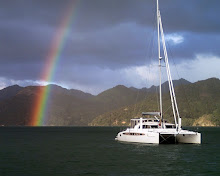A pleasant 25 mile day sail from the island of Ua Pou took us to the
island of Nuka Hiva where we anchored in Taiohae Bay near the largest
population center in the Marquesas. It was here that author Herman
Melville jumped ship to stay for a few years and write his novel “Typee”.
We were pleased to see several boats in the anchorage that we recognized
from Mexico and, even though rain showers were moving through the area, we
launched “Blue Rodeo’s” dinghy and went to shore for an evening of
socializing and dinner. During the ride to shore, a squall with heavy
rain passed overhead and, by the time we reached the dock, we were soaked
to our skin. We have grown accustomed to the frequent showers in the lush
Marquesas and find them a refreshing, if inconvenient, occurrence.
Being that it was a Sunday night, things in town were even quieter than
normal and our dining options were limited to a simple open air restaurant
at the harbor. Even though the couple that owned it was preparing to
close when we arrived, they were happy to prepare steaks, French fries and
salads for our hungry group of 8. For most of us, it was a first meal out
in a long time and we all enjoyed it immensely.
The next day was spent obtaining diesel fuel for “Blue Rodeo” and gasoline
for our outboard motors. There is a filling station on the quay in the
harbor but tying up a boat’s stern to the rough concrete wall and fueling
from a 30’ long hose can be difficult in any sort of windy and rolly
conditions. We decided to check out the situation first by dinghy before
going to the trouble to take our boat there. After sizing up the quay,
which is designed to accommodate much larger vessels than us, we opted
instead to make several trips in with our 5 gallon plastic jerry cans.
The process was exhausting as the full jugs of fuel had to be carried from
the filling station to a point on the concrete quay where a stainless
steel ladder descended 8 feet to the water. While Mark filled the jugs
and carried them back, Anne waited in the dinghy being tossed about by the
swells and current. Each of our 4 jerry cans was then lowered by rope to
the dinghy for the trip back to “Blue Rodeo”. There, the heavy jugs had
to be lifted aboard over our lifelines and then carefully emptied, using a
funnel, into our fuel tanks. Fortunately, we needed just 33 gallons of
diesel but, since we wanted to depart with all 4 of our 5 gallon jugs
filled as reserves, 3 round trips were required before the job was done.
Al off this was done in the tropical heat and humidity which left us
tired, crabby and drenched with sweat when we were finished.
With the fueling task complete, we had just enough time to take our
passports and boat paperwork to the office of the gendarme to officially
check in. Since we would remain only a short while, we were able to check
in to Taiohae and check out for our next destination in the same visit.
Other cruisers had informed us that the hospital near the gendarme’s
office provided free medication for the prevention of an insect-borne,
tropical disease that can, if untreated, lead to Elephantitis. We knew of
what terrible consequences contracting that disease can produce so we made
the effort to get the pills and be on the safe side. Even though the
nurse in the dispensary spoke very little English, with the aid of a
poster on the wall showing photos of people with terribly swollen
anatomical parts, we were able to convey what we were seeking. With pills
in hand, we rendezvoused with our friends from the yacht “Panta Rhei” for
a walk through town to a beautiful, hillside, bungalow-style hotel where
we indulged ourselves with drinks on their deck and a delicious meal in
their restaurant. From the hotel, the view of the bay and our anchored
boats below was spectacular and the company was delightful. A fine
evening was had by all.
Early the next morning, we made the rounds through the town’s small
markets hoping to purchase as much fresh produce as we could for our
upcoming trip through the Tuamotu Archipelago. We have come to expect
that, between the arrivals of the supply ships that come from Tahiti,
supplies are often limited in these islands and the best source of fresh
fruit or produce is the local residents. Through a tip from a cruising
friend, Anne learned of a woman that sells produce grown by the town’s
school of agriculture. So, after our limited success in the markets, she
and two friends made a trek to the school and returned lugging bags of
turnips, tomatoes, lettuce and sausages made from a freshly butchered pig.
That afternoon, with provisioning accomplished, we motor- sailed a short
distance west along Nuku Hiva’s rocky shoreline to Daniels Bay where we
would spend several days hiking and socializing with a few local families
and our cruising friends
Subscribe to:
Post Comments (Atom)

No comments:
Post a Comment